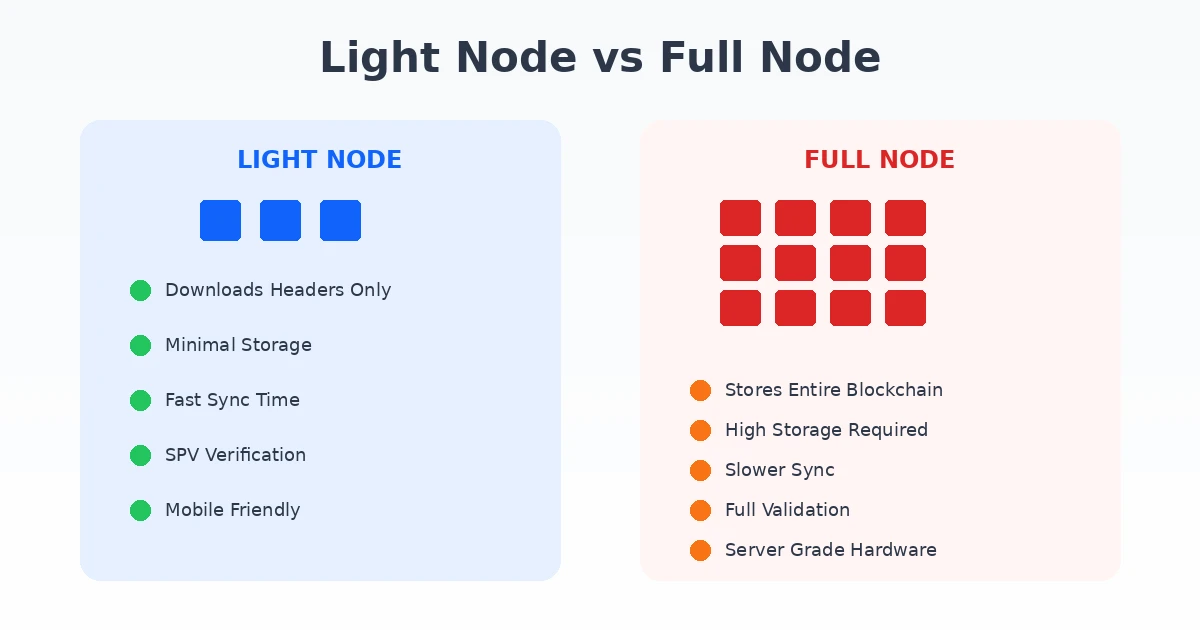Key Takeaways
- ✓ Light nodes download only block headers instead of the full blockchain, making them storage efficient and faster to synchronize.
- ✓ They enable broader network participation by allowing devices with limited resources like smartphones to interact with blockchain networks.
- ✓ Light nodes are critical for decentralized application (dApp) development, reducing infrastructure costs while maintaining functionality.
- ✓ Cross-chain interoperability becomes feasible through light nodes due to their ability to quickly verify data across multiple blockchains.
- ✓ While they rely on full nodes for complete transaction data, proper implementation with robust consensus mechanisms can mitigate security concerns.
Blockchain technology has grown far beyond its original cryptocurrency roots. Today, organizations across industries are exploring how distributed ledger systems can transform their operations. But as these networks expand, a significant challenge emerges: how do you make blockchain accessible without requiring every participant to maintain a complete copy of the entire transaction history?
This question becomes increasingly relevant when you consider that the Bitcoin blockchain alone exceeds 500 GB in size as of 2024. Expecting every user to download and store this amount of data simply is not practical. This is where light nodes come into play, offering a streamlined approach that balances accessibility with the core principles of decentralized verification.
The concept of Simplified Payment Verification was actually described by Satoshi Nakamoto in the original Bitcoin whitepaper. Over the years, this idea has evolved into what we now call light nodes or lightweight clients. These components have become foundational for building advanced blockchain solutions that can scale to meet real world demands.
What Exactly is a Light Node?
A light node is a type of blockchain participant that operates with minimal data requirements. Rather than downloading every transaction ever recorded on the network, it retrieves only the block headers. These headers contain essential metadata including timestamps, cryptographic hashes linking blocks together, and proof of work information that validates the chain’s integrity.
Think of it like reading the table of contents and chapter summaries of a book instead of the entire manuscript. You get enough information to verify the book’s structure and authenticity without needing to store every page. The light node trusts that the detailed content exists and can request specific sections when necessary.
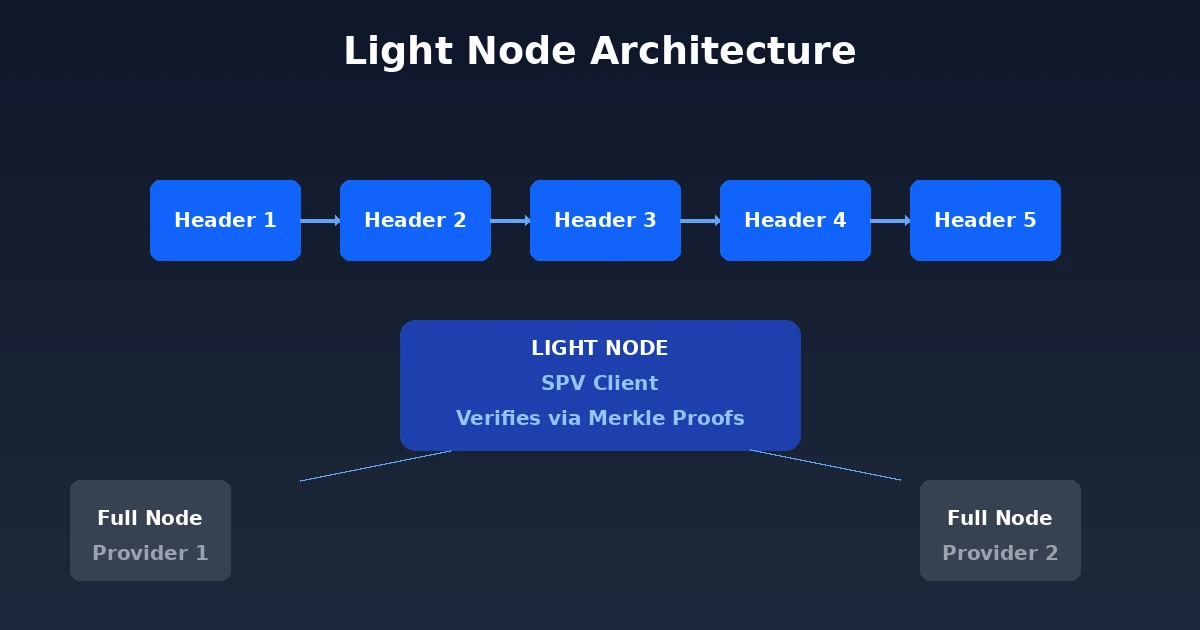
This approach makes light nodes particularly valuable for mobile applications, embedded systems, and any environment where storage space or bandwidth comes at a premium. A smartphone user can verify their cryptocurrency balance and send transactions without dedicating hundreds of gigabytes to blockchain data.
Light Nodes Compared to Full Nodes
Understanding the distinction between light nodes and full nodes helps clarify when each type makes sense. Full nodes maintain complete copies of the blockchain and independently validate every transaction. They represent the backbone of network security because they can detect any attempt to manipulate the ledger.
Light nodes take a different approach. They verify transactions through Merkle proofs, a cryptographic technique that confirms a specific transaction exists within a block without requiring the entire block’s contents. This verification method maintains security while dramatically reducing resource requirements.
| Characteristic | Light Node | Full Node |
|---|---|---|
| Storage Requirements | Megabytes (block headers only) | Hundreds of gigabytes (full chain) |
| Sync Time | Minutes to hours | Days to weeks |
| Hardware Needs | Mobile devices, basic computers | Dedicated servers, high-end hardware |
| Verification Method | SPV with Merkle proofs | Complete transaction validation |
| Trust Model | Relies on full nodes for data | Fully trustless verification |
| Network Contribution | Consumer of data | Provider of data and validation |
At Nadcab Labs, our 8+ years of experience in blockchain development has shown us that the most effective network architectures leverage both node types strategically. The key lies in understanding which approach serves specific use cases best.
Why Light Nodes Matter for Blockchain Scalability
Scalability remains one of the most discussed challenges in blockchain technology. Networks need to handle increasing transaction volumes without becoming prohibitively expensive or slow. Light nodes address this challenge from the user accessibility angle rather than the throughput angle.
When more people can participate in a network without significant infrastructure investment, the overall ecosystem grows stronger. This growth creates network effects that benefit everyone involved. More users mean more transactions, which drives innovation and development.
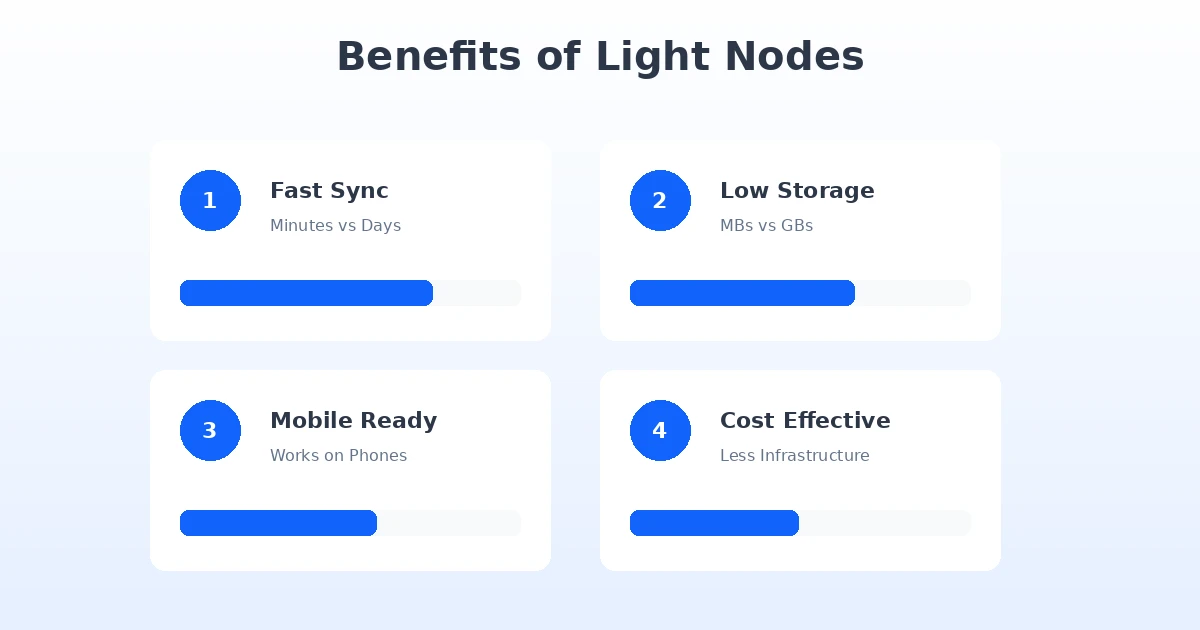
Consider a supply chain application where thousands of IoT sensors need to record data to a blockchain. Running full nodes on each sensor would be impossible due to power and storage constraints. Light nodes make this scenario practical by allowing each sensor to participate with minimal overhead while still maintaining cryptographic verification.
The reduced bandwidth requirements also matter significantly. Light nodes can operate effectively on mobile data connections or in regions with limited internet infrastructure. This accessibility opens blockchain technology to markets and applications that full-node-only architectures cannot reach.
Security Considerations and How to Address Them
Critics sometimes point out that light nodes introduce trust assumptions that full nodes avoid. This concern has merit. When a light node requests transaction data from full nodes or RPC providers, it trusts that the returned information is accurate. A malicious provider could theoretically supply false data.
However, several mitigation strategies exist. First, light nodes can connect to multiple independent full nodes and compare responses. Any discrepancy triggers verification procedures. Second, the mathematical properties of Merkle proofs make it computationally infeasible to create fake proofs that a light node would accept.
The blockchain community has also developed fraud proofs and other cryptographic techniques that allow light nodes to detect certain types of invalid blocks without full validation. These advancements continue improving the security profile of lightweight clients.
Proper network architecture plays a crucial role here. Having a healthy ratio of full nodes to light nodes ensures that trustworthy data sources remain available. Organizations deploying blockchain solutions should consider running their own full nodes to support their light node users and maintain data integrity within their ecosystem.
Ready to Build Scalable Blockchain Solutions?
Work with experts who understand light node implementation inside and out. Our team delivers blockchain architectures that balance performance, security, and accessibility.
Light Nodes and Decentralized Applications
Decentralized applications have emerged as one of the most compelling use cases for blockchain technology. From DeFi protocols to gaming platforms to social networks, dApps are reshaping how we think about software ownership and user data. Light nodes serve as the bridge connecting end users to these applications.
Without light nodes, every dApp user would need to run resource-intensive software just to check their account balance or submit a transaction. This barrier would eliminate the casual user base that makes applications viable. Instead, light node infrastructure allows wallet applications and dApp frontends to provide instant access while maintaining blockchain verification.
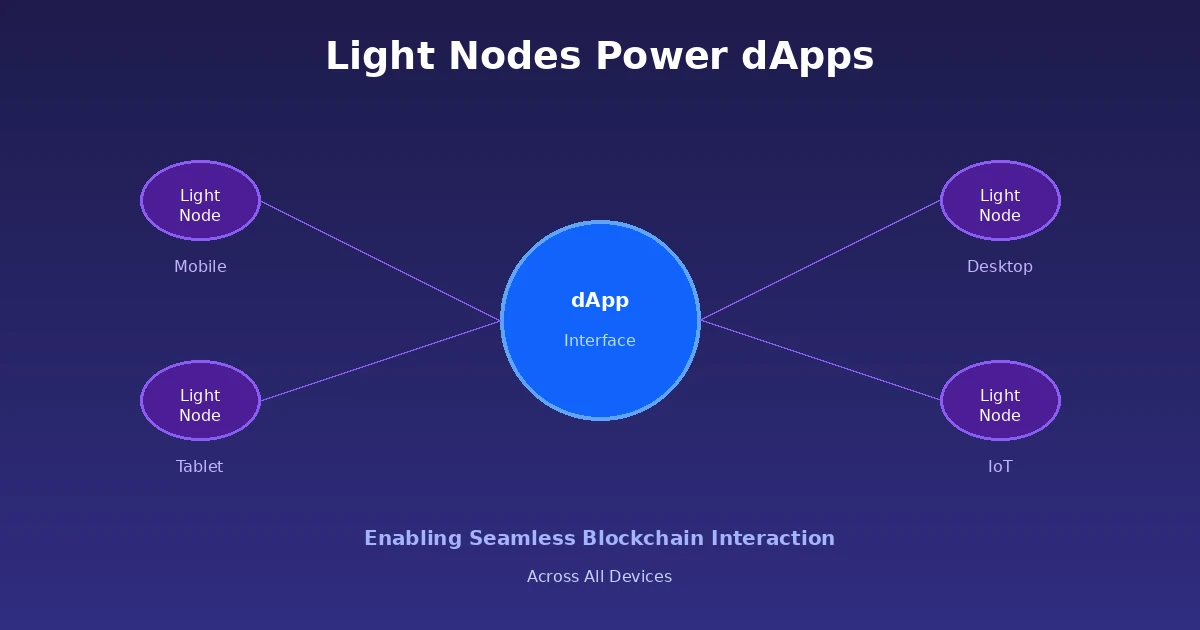
The developer experience improves as well. Building a dApp that requires users to run full nodes limits your potential audience dramatically. Light node compatibility means your application can reach anyone with a web browser or smartphone. This accessibility is not optional for consumer-facing applications; it is essential for adoption.
The Light Node Implementation Lifecycle
Implementing light nodes within a blockchain project follows a structured process. Understanding these stages helps organizations plan their development timelines and resource allocation effectively.
| Phase | Activities | Key Deliverables |
|---|---|---|
| 1. Assessment | Analyze network requirements, user base characteristics, security needs | Requirements document, risk assessment |
| 2. Architecture Design | Define node topology, data flow patterns, fallback mechanisms | Technical architecture, API specifications |
| 3. Development | Build light node client, integrate with existing infrastructure | Working codebase, test suite |
| 4. Testing | Security audits, performance benchmarking, edge case validation | Audit reports, performance metrics |
| 5. Deployment | Staged rollout, monitoring setup, user documentation | Production system, operational runbooks |
| 6. Optimization | Continuous improvement based on real-world usage data | Performance improvements, feature updates |
Each phase requires specific expertise. Our team at Nadcab Labs has guided dozens of organizations through this process, identifying potential issues early and implementing solutions that stand up to production demands. Understanding how blockchain technology works at a fundamental level allows us to make informed decisions at each stage.
Cross-Chain Interoperability Through Light Nodes
As the blockchain ecosystem matures, the ability to move assets and data between different networks becomes increasingly important. No single blockchain will dominate every use case. Different chains optimize for different properties like speed, security, or programmability. Users and applications need ways to operate across these boundaries.
Light nodes enable efficient cross-chain communication. Because they can quickly sync with any blockchain that supports the SPV model, they serve as lightweight bridges between networks. A cross-chain protocol might use light nodes to verify that a transaction occurred on Chain A before releasing corresponding assets on Chain B.
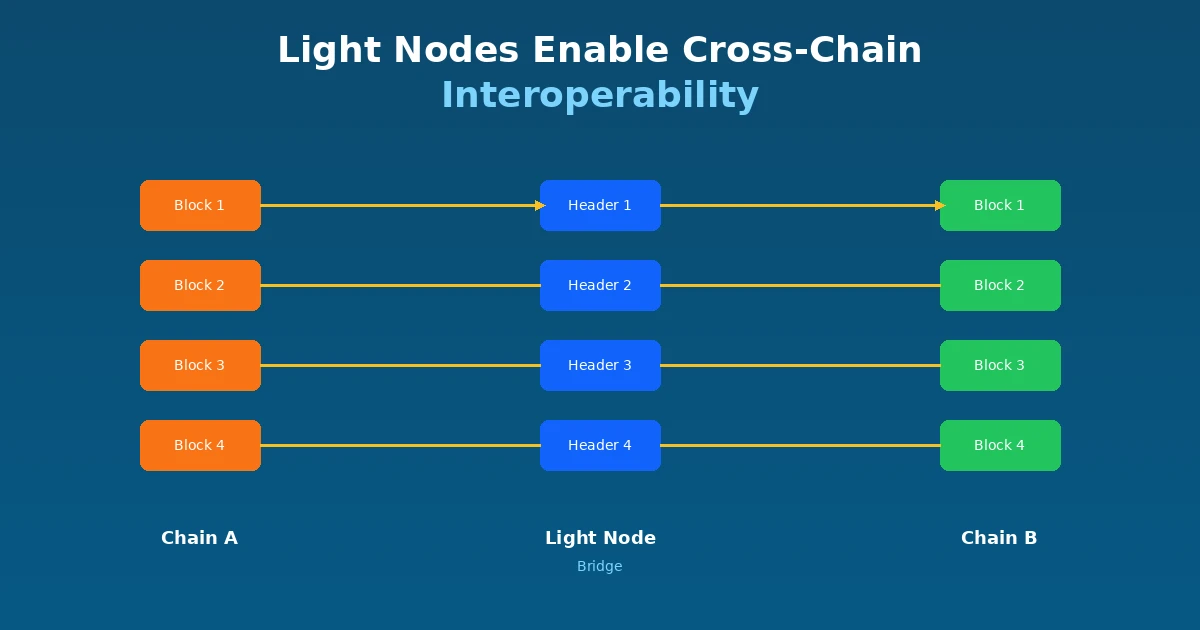
This verification happens without requiring the bridge operator to run full nodes for every supported blockchain. The resource savings scale dramatically as more chains are added to the interoperability network. What would require a data center with full nodes can instead run on modest hardware using light node verification.
Real World Applications and Use Cases
The theoretical benefits of light nodes translate into concrete advantages across multiple industries. Financial applications use them to provide wallet functionality without requiring users to download entire blockchains. Supply chain systems deploy light nodes on edge devices that track goods through logistics networks.
Gaming platforms leverage light nodes to verify in-game asset ownership and enable trading without the latency that full validation would introduce. Healthcare applications can record patient consent on blockchain using light node interfaces that integrate into existing hospital systems without requiring dedicated infrastructure.
The history of blockchain shows a clear trajectory toward greater accessibility. Each generation of technology has lowered the barriers to participation. Light nodes represent a crucial step in this evolution, making blockchain practical for applications that would otherwise be impossible to deploy.
Why Nadcab Labs for Your Light Node Implementation
Choosing the right development partner matters enormously when implementing blockchain infrastructure. Light node integration requires deep understanding of cryptographic protocols, network architecture, and the specific requirements of your use case. Generic development shops often lack this specialized knowledge.
Nadcab Labs brings over 8 years of dedicated blockchain development experience to every project. We have implemented light node solutions across various blockchain platforms including Ethereum, Binance Smart Chain, Polygon, and custom enterprise blockchains. This breadth of experience means we can recommend the optimal approach for your specific situation rather than applying a one-size-fits-all template.
Our consulting process begins with understanding your business objectives, not jumping straight to technical implementation. We help clients identify whether light nodes are the right solution and design architectures that balance security, performance, and cost. When light nodes are appropriate, we handle the complete implementation lifecycle from initial design through production deployment and ongoing optimization.
The blockchain space moves quickly. New protocols emerge, security best practices evolve, and user expectations increase. Working with a team that stays current with these developments ensures your implementation remains effective over time. Our ongoing engagement with the broader blockchain developer community keeps us at the forefront of light node technology.
Transform Your Blockchain Vision Into Reality
Whether you need light node integration for an existing platform or are building a new blockchain solution from scratch, our team has the expertise to deliver results.
Looking Ahead: The Future of Light Node Technology
Research continues advancing the capabilities and security of light nodes. Zero-knowledge proofs offer the potential to provide stronger verification guarantees without increasing resource requirements. Stateless client designs could eliminate even the minimal storage needs of current light node implementations.
As layer 2 scaling solutions mature, the interaction between light nodes and these systems creates new architectural possibilities. Light nodes might verify rollup proofs directly, providing users with strong security guarantees while maintaining the efficiency benefits that make lightweight clients valuable.
The trajectory points toward a future where blockchain participation requires minimal technical resources while maintaining the security properties that make these systems trustworthy. Organizations investing in light node infrastructure today position themselves to take advantage of these improvements as they emerge.
Conclusion
Light nodes have evolved from a theoretical concept in a whitepaper to an essential component of modern blockchain architecture. They solve the fundamental tension between decentralization and accessibility, enabling broader participation without compromising the verification guarantees that make blockchain valuable.
For organizations building advanced blockchain solutions, understanding and properly implementing light nodes can mean the difference between a project that reaches its intended users and one that remains limited to technically sophisticated early adopters. The efficiency gains, reduced infrastructure costs, and improved user experience all contribute to successful blockchain deployments.
The question is no longer whether light nodes belong in your blockchain strategy, but how to implement them effectively. With proper architecture, security considerations, and expert guidance, light nodes become a powerful tool for delivering the benefits of blockchain technology to real-world applications and users who need them.
Frequently Asked Questions
A light node serves as a lightweight way for users to interact with blockchain networks without downloading the entire transaction history. Instead of storing hundreds of gigabytes of data like full nodes do, light nodes download only block headers containing essential metadata. This allows smartphones, tablets, and basic computers to verify transactions using Simplified Payment Verification. The primary purpose is making blockchain accessible to everyday users who cannot dedicate server-grade hardware to participate in the network.
Light nodes use a cryptographic technique called Merkle proofs to verify transactions. When a user needs to confirm a transaction, the light node requests proof from full nodes that the transaction exists within a specific block. The Merkle proof provides a mathematical path from the transaction to the block header, which the light node already possesses. If the proof validates correctly against the header, the transaction is confirmed authentic. This method ensures security while requiring only megabytes of storage instead of the complete blockchain data that full nodes maintain.
Light nodes introduce different security tradeoffs rather than being inherently less secure. They rely on full nodes for detailed transaction data, creating a trust dependency that full nodes avoid. However, several factors mitigate this risk. Light nodes can query multiple independent full nodes and compare responses to detect inconsistencies. Merkle proofs are mathematically secure and cannot be faked without detection. Modern protocols also include fraud proofs that alert light nodes to invalid blocks. For most user applications, properly implemented light nodes provide adequate security for everyday transactions.
Light nodes are designed to run on resource-constrained devices that cannot support full node operations. Mobile phones running iOS and Android commonly use light node wallet applications to interact with cryptocurrency networks. Tablets, Chromebooks, and entry-level laptops work well for light node software. Internet of Things devices in supply chain and logistics applications often embed light node functionality. Even web browsers can run JavaScript-based light node implementations for decentralized application access. The key requirement is basic internet connectivity rather than high-end hardware specifications.
Light nodes enable efficient cross-chain bridges by providing lightweight verification across multiple blockchain networks. A bridge protocol can run light nodes for different chains simultaneously, verifying that transactions occurred on the source chain before releasing assets on the destination chain. Because light nodes require minimal resources per chain, supporting dozens of blockchains becomes practical without massive infrastructure investment. This efficiency allows interoperability protocols to scale their network support rapidly while maintaining cryptographic verification standards that users expect from blockchain systems.
Light nodes are fundamental to making decentralized applications accessible to mainstream users. Without light nodes, every dApp user would need full node infrastructure just to check balances or submit transactions. Mobile wallet apps, browser extensions, and dApp frontends rely on light node protocols to provide instant blockchain access. Developers can build applications that reach anyone with a smartphone rather than limiting their audience to users with dedicated hardware. This accessibility drives adoption and enables the consumer-facing applications that demonstrate blockchain value beyond cryptocurrency speculation.
Reviewed & Edited By

Aman Vaths
Founder of Nadcab Labs
Aman Vaths is the Founder & CTO of Nadcab Labs, a global digital engineering company delivering enterprise-grade solutions across AI, Web3, Blockchain, Big Data, Cloud, Cybersecurity, and Modern Application Development. With deep technical leadership and product innovation experience, Aman has positioned Nadcab Labs as one of the most advanced engineering companies driving the next era of intelligent, secure, and scalable software systems. Under his leadership, Nadcab Labs has built 2,000+ global projects across sectors including fintech, banking, healthcare, real estate, logistics, gaming, manufacturing, and next-generation DePIN networks. Aman’s strength lies in architecting high-performance systems, end-to-end platform engineering, and designing enterprise solutions that operate at global scale.

